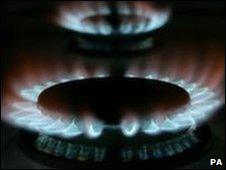Green steps 'hurting people in fuel poverty'
- Published

Millions struggle to afford their gas and electricity bills
People in fuel poverty face being unfairly hit by the costs of investment in energy infrastructure and reducing greenhouse gases, a report says.
Such spending may see energy bills rise by 50% - on top of 125% rises seen in the past six years - the government's Fuel Poverty Advisory Group said.
This was "regressive" and would "disproportionately" impact those people on low incomes, it warned.
Energy firms should prioritise the fuel poor, the group added.
The group also urged the government to guarantee the future of the Warm Front scheme, which offers grants to tackle fuel poverty - defined as spending over 10% of household income on energy bills.
'Unsuitable'
The latest figures suggest that, in England alone, some 4.8 million households fit the government's definition of fuel poverty - with the vast majority of them classified as vulnerable because they include the elderly, the disabled or children.
The advisory group said it recognised the "essential" needed to invest in green measures.
But it said that the principle of paying for these through bill savings would "not deliver for the poorest energy customers".
"Although potentially a very good initiative for many consumers, it is unsuitable for the majority of fuel poor households who already under-heat their homes to cut costs, and would therefore be unlikely to make the bill savings required to pay for the measures," said Derek Lickorish, the group's chairman.
"Unaffordable energy bills already cause misery for millions and without urgent action the situation is going to get much worse".
Helping make homes more energy efficient was the "only solution" he added, saying this would cut carbon emissions and create jobs as well as benefiting those whose homes were improved.
Ministers in the last government aimed to end fuel poverty in England among households which include the elderly, the disabled or children this year - and entirely by 2016.
But the Energy and Climate Change Committee has predicted the first target will be missed - and says the second looks "increasingly difficult to hit".
The consumer rights body, Consumer Focus, said the number of people affected by fuel poverty was "shockingly high" and was "only likely to increase as energy bills rise in the next decade".
"It is essential that the government has an effective strategy to ensure the poorest households are not unfairly penalised by rising bills," said the body's head of energy, Audrey Gallacher.
"At the heart of any package of measures should be greater targeting of energy efficiency help to the poorest homes, which leak most heat."